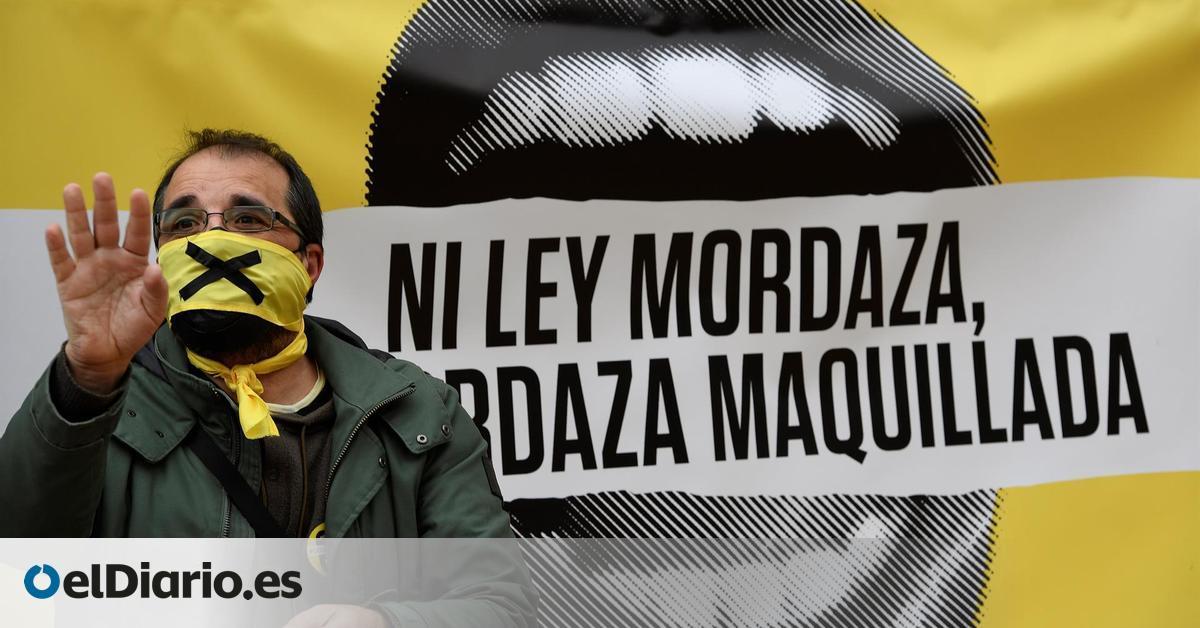
The reform of the gag law will once again sleep in a drawer in the remainder of the legislature and the Government will not be able to fulfill one of the main promises of the coalition. Esquerra Republicana and EH Bildu have voted against the report of the presentation that this Tuesday was addressed by the Interior Commission in Congress, on which the groups have been working for more than a year and a half, understanding that it does not “repeal the most harmful articles ” and keeps “intact” the core of the rule that Mariano Rajoy’s absolute majority approved in 2015 to cut down the protest in the streets, which will remain in force.
Rajoy’s gag law survives five years of a left-wing majority and the Government gives up its reform
Further
The text was voted on at 12:30 p.m. this Tuesday, with a result of 19 votes against and 18 in favour, including those of the two government parties, which has prevented the Commission from issuing an opinion on the report to send it to plenary congressional. Due to parliamentary times and the impossibility of a parliamentary agreement on this issue during the long processing of this reform, it will now be impossible for the reform to be addressed during the remainder of the legislature.
The failure of this rule had been brewing for weeks due to the immobility of the positions of PSOE, Unidas Podemos and PNV on the one hand and ERC and EH Bildu on the other on four specific points: the use of rubber balls –which this rule does not regulate –, hot returns, fines for disobedience and disrespect for authority. The two formations of the Government have transferred so far that the text negotiated so far already annuls the most harmful aspects, but the parliamentary partners have never shown themselves willing to support a reform that does not touch those articles.
This morning, the ERC spokesperson in the Commission, Maria Danta, and EH Bildu spokesperson, Jon Iñarritu, announced shortly before the meeting their vote against a text that “makes up” and does not repeal the Citizen Security Law of the Minister of the Interior with the PP Jorge Fernández Díaz. “ERC wants to repeal the gag law, not wash its face,” Danta has warned.
“It is far from the repeal commitment that the political forces assumed eight years ago. The fact of wanting to maintain the most damaging aspects of Rajoy’s gag makes it unaffordable to vote in favor of the proposal. We do not want to be accomplices of a sweetened gag law”, said Iñarritu, whose group does not understand that the articles of disrespect and disobedience are not addressed – the ones that generate the most fines – or aspects such as hot returns or that it does not prohibit the rubber balls. “If the Government wants to maintain the police abuses that they call two or three little things, let them do it but not with our votes,” Danta insisted. In parallel, both groups have provided some compromise amendments to try to reach a last-minute agreement, but the gesture has been more a declaration of intent than a movement with expectations.
While the debate was taking place in the Commission, the spokesman for the Republican Left in Congress, Gabriel Rufián, raised his tone against the PSOE at a press conference and showed two photographs. In the first place, that of one of the hot returns that took place in one of the last attempts to jump over the fence in Melilla, and on the other hand, the image of a woman without an eye due to the impact of a ball eraser. “Neither this nor this disappears with the proposal of the PSOE and Unidas Podemos,” said Rufián, showing the two images. “The reform continues to allow this, hot returns, dozens of deaths at the border as seen this summer. It continues to allow this, gouge people out with rubber balls”, added the Republican spokesman to ask PSOE and Unidas Podemos to give answers on why they endorse a reform that allows this.
Shortly after and once the result of the vote was known, the socialist spokesman, Patxi López, regretted the “excuses” that in his opinion the partners have made for not approving the opinion. As he has said, one of those excuses is the argument that Esquerra Republicana has defended during the negotiation that the use of rubber balls is already prohibited in Catalonia and that, as he has said, is not true, there is simply a proposition that has no value legal. On the other hand, he has affirmed that hot returns should be reformed in the Immigration Law and not in this text, although during the parliamentary negotiations it was even suggested that this law would have a mention with a deadline to address the prohibition of this practice without impeding that this regulation was given in another text.
In any case, the negotiation of this text was acrimonious in two other articles, those that regulated the sanctions for lack of respect for authority and for disobedience. López has assured this Tuesday that his party was not going to “unprotect” or “undress” the authority of those agents who must guarantee authority, which in his opinion implied the drafting of the articles that ERC and EH had proposed Bildu.
In the Council of Ministers, the government spokesperson, Isabel Rodríguez, has insisted on this idea and has accused the partners of “allowing” the PP gag law to remain in force. “We have observed that ERC and EH Bildu have prevented this reform from going ahead, the non-acceptance of these amendments has prevented this regulation from being taken out and the PP regulation from continuing in force,” Rodríguez said at the press conference after the Council of Ministers .
The PSOE defends that throughout the parliamentary process they have done an important job of rapprochement and have shown generosity, since, they point out in the party, the text has not even left their group and they have negotiated most of the amendments that they proposed at the beginning of law negotiations. In addition, they accuse Esquerra of using false arguments when, for example, negotiating the inclusion of rubber balls in the text. They maintain that in Catalonia they are not prohibited and that the fact that the Generalitat does not use them does not mean that they cannot do so in the future.
Although Unidas Podemos has aligned itself with the socialists during the reform process and has defended that the text as it is can already be considered as eliminating the most problematic aspects of the law, yesterday the group led by Ione Belarra criticized the “absolute refusal” of his government partner to repeal those four points and therefore lead the reform to failure. Party sources regretted that the PSOE, instead of delaying the commission to give time to negotiate, decided to “precipitate it to force the fall.”
This Tuesday, the Minister of Social Rights has insisted on her criticism of the Socialists. “The repeal of the gag law falls into commission. I find the PSOE’s closure to negotiate incomprehensible. In opposition he promised to repeal it completely. The coalition government cannot afford to waste the last year of the legislature like this, ”she lamented in a Twitter message.
The position in the last hours has caused a division of criteria in the confederal group at least when it comes to distributing the blame. The rapporteur for the reform, Enrique Santiago, has considered after the vote that “no democrat”, “no one from the left” can understand that an agreement has not been reached. Then he added: “The right and the extreme right, with surprising support, have managed to get it not approved.”
At a press conference, the UP spokesman in Congress, Pablo Echenique, has considered that it is compatible to defend, as Santiago has done during the negotiation, that the advances had been significant and at the same time accuse the PSOE of not having moved enough . “Enrique Santiago has done an exceptional job in the negotiation and I want to acknowledge it. The amount of progress that has been achieved is very important and in fact we are going to vote in favor of the opinion because we value the progress that has been achieved very positively”, he said. Immediately afterwards, he added that the two government parties do not have an absolute majority and therefore, if the members’ votes are lacking, “you have to negotiate and accept part of the proposals.”
Source: www.eldiario.es

